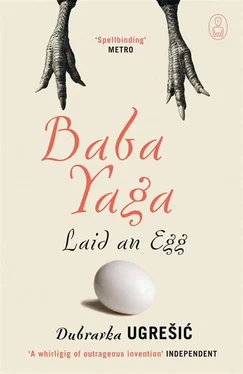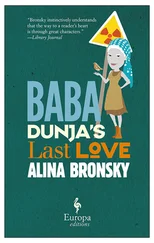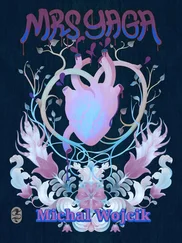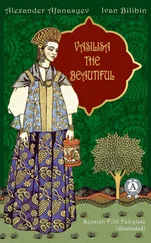‘If the gentleman affected by the near future of his gender had not left the hall, he would have heard the consoling fact that things are quite different in mythology. There it is exclusively the men who are long-lived, which makes sense since the creators of that mythology were men. So, Methuselah, the oldest being in the history of the human imagination, is credited with a life of nine hundred and sixty-nine years. Our forefather Adam lived nine hundred and thirty years, his son Seth nine hundred and twelve and Adam’s grandson Enoch nine hundred and five years…
‘We will not find any information about Eve and her age in the Bible,’ said Dr Topolanek significantly. ‘Eve was made from Adam’s rib. That mythological fact gave Eve and the whole female gender a secondary status, which is why women from Eve on have on the whole been treated like – ribs.’
There was a giggle from the audience. It was Beba, who was amused by Topolanek’s dramatic performance, and his observation about rib-women.
‘Noah lived to be nine hundred and fifty, which is the first confirmation that genetics play a major role in longevity,’ continued Topolanek. ‘Noah was Methuselah’s grandson, and probably the last long-lived man in the history of humanity. After the Great Flood, human life was no longer measured on a heavenly but a human scale, no longer by the gods, but by mortals. The Great Flood divided the two worlds once and for all: from then on the divine was to belong exclusively to the gods, while the human was left to human beings. In the human world, longevity was achieved only by important people: saints, prophets and rulers. Thus Abraham lived to be a hundred and sixty-five, and Moses a hundred and twenty, while ordinary mortals lived out their brief human lifetime…
‘And the idea of longevity,’ continued Dr Topolanek, ‘was transferred into Utopias and legends about paradise on earth, about healing springs, fountains of youth, living and dead water, about the tree of life, about special races, tribes, islands and places usually situated in far-flung areas of the globe. There are legends about the “golden age” and people who lived young and carefree for many years, and when the time came for them to pass into the next world, they would simply fall asleep. There is a legend about the Egyptians who, according to Herod, were the most handsome and tallest people in the world, and who lived on average a hundred and fifty years, in great cheerfulness, happiness and friendship with their gods. The ancient Greeks believed that there were people in India with the heads of dogs, the Cynocephali, who lived some two hundred years, unlike the Pygmies, who, according to the ancient Greeks, lived barely eight years. There is a legend about long-lived people in Africa, called the Macrobi, and a legend about the Hyperboreans, who lived in the far north, and whose lifespan was a thousand years. One of the most entertaining legends was spread by the Greek Iambulus. He was borne by the sea onto an island in the middle of the Indian ocean, inhabited by beautiful people over six feet tall. These people spoke the language of birds and had the ability to talk to two people simultaneously, because their tongues were pronged like forks. They did not practise monogamy, but shared their women, they cared for their children communally and lived well and happily for a hundred and fifty years…’
‘This doctor of ours has hardly started. By the time he reaches Bulgarian yoghurt, botox and anti-oxidants, we’ll all be skeletons,’ Beba whispered to Kukla.
At this moment Pupa also woke up.
‘Are we staying or shall we call it a day?’ she asked.
‘Let’s call it a day!’ all three agreed.
Kukla apologised to Dr Topolanek, inventing a reason why they could not stay for his lecture.
‘That’s absolutely fine,’ said Dr Topolanek. ‘But you will come tomorrow, won’t you?’
‘But of course!’ said Pupa, Beba and Kukla sweetly in unison.
As soon as they were outside, Pupa said resolutely: ‘Not on your life!’
Here we have to say that Pupa, Beba and Kukla were unfair to Dr Topolanek, and it really was a shame that they left the hall: they missed hearing all kinds of interesting things, for instance Plato’s idea of a happier world, which would come into being as soon as the whole universe started moving in the opposite direction. Instead of being born from sexual union, people would spring out of the earth like plants, straight into their adult form, and then they would steadily become younger, and in the end return to the earth. Life might not be longer than ours today, but it would certainly be happier, because it would be free of ageing and death. Pupa, Kukla and Beba missed hearing the interesting story of Medea who, in order to make Jason’s father younger, carried out the first transfusion in the history of medicine. Medea slit the old man’s throat with a sword, let the blood run out and then filled the old man’s veins with her own concoction, consisting of many spices, plants, roots, seeds, deer’s liver and vampire’s entrails. The old man’s white hair darkened, his wrinkles were smoothed out, his limbs twitched into life, his heart began to beat faster and the burden of some forty years slipped from his ancient body.
Yes, the three old girls had missed learning a lot more, but we too, unfortunately, must press on. While people yearn for what they cannot get, the tale hastens on, with no regret!
The son of one of Pupa’s patients told her that he had once taken his mother out in her wheelchair, to sit outside the house for a while and breathe in the fresh air. It was the end of November, and he had snuggled her up in blankets so that she wouldn’t catch cold. He went back into the house for a moment to get his cigarettes, then forgot what he had gone for, so sat down and smoked a cigarette… In the meantime, it began to snow. And when it was getting dark and the old woman was covered in snow like a haystack, the son remembered to his horror that she was still outside. The old lady was so senile that she did not understand what was going on. She had enjoyed watching the snowflakes and had not even caught a cold.
Pupa often dreamed about how nice it would be if someone were to take her to Greenland and forget about her, lose her the way one loses an umbrella or gloves. She had reached a stage where she was unable to do anything any more. She was like a rubber plant, moved from place to place, carried out onto the balcony to have its fill of air, brought into the house so as not to freeze, regularly watered and dusted. How could a rubber plant make decisions or commit suicide?
All primitive cultures knew how to manage old age. The rules were simple: when old people were no longer capable of contributing to the community, they were left to die or they were helped to move into the next world. Like that Japanese film in which a son stuffs his mother into a basket and carries her to the top of a mountain to die. Even elephants are cleverer than people. When their time comes, they move away from the herd, go to their graveyard, lie down on the pile of elephant bones and wait to be transformed into bones themselves. While today hypocrites, appalled by the primitive nature of former customs, terrorise their old people without the slightest pang of conscience. They are not capable of killing them, or looking after them, or building proper institutions, or organising proper care for them. They leave them in dying rooms, in old people’s homes or, if they have connections, they prolong their stay in geriatric wards in hospitals in the hope that the old people will turn up their toes before anyone notices that their stay there was unnecessary. In Dalmatia people treat their donkeys more tenderly than their old people. When their donkeys get old, they take them off in boats to uninhabited islands and leave them there to die. Pupa had once set foot on one of those donkey graveyards.
Читать дальше












